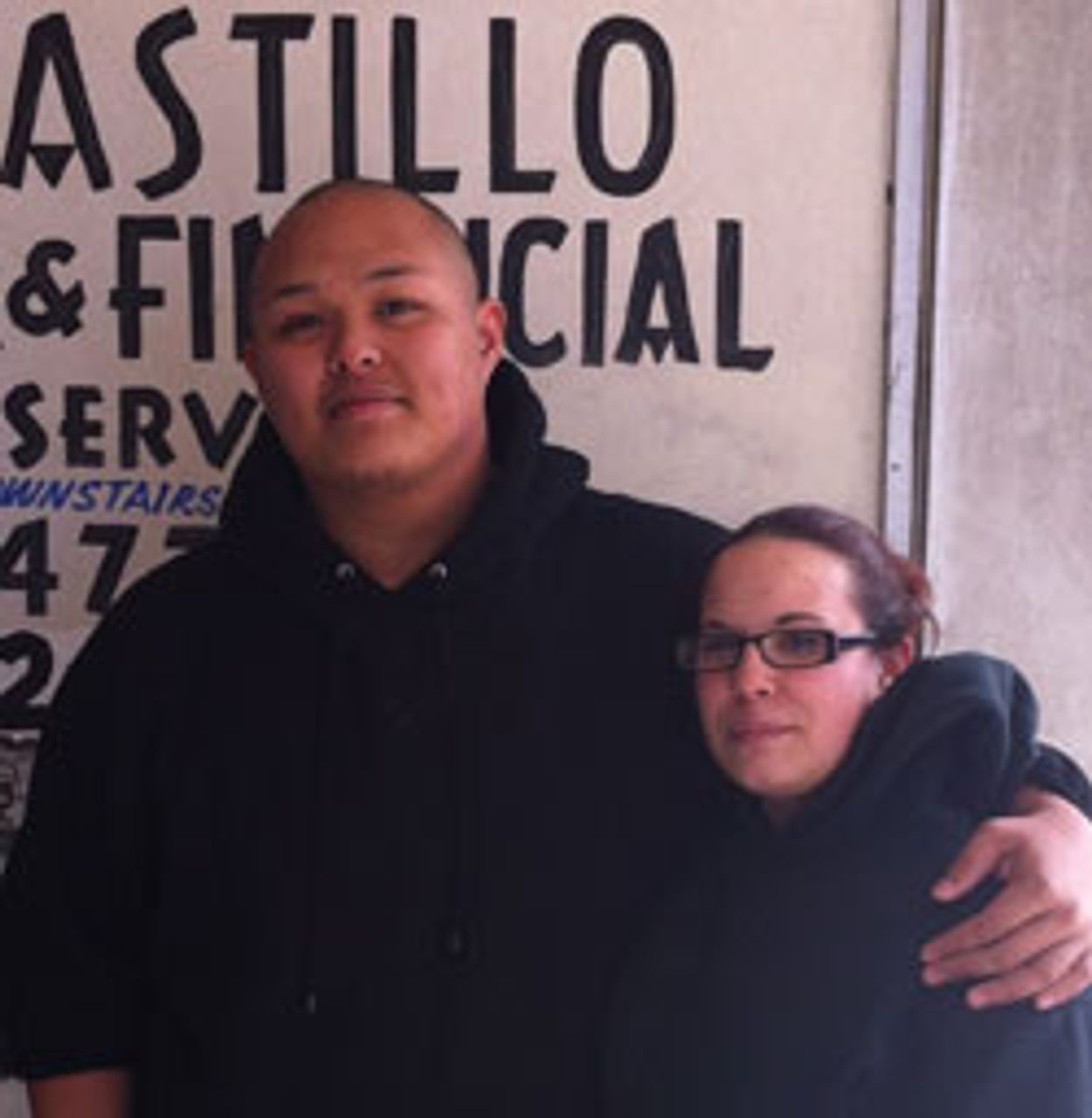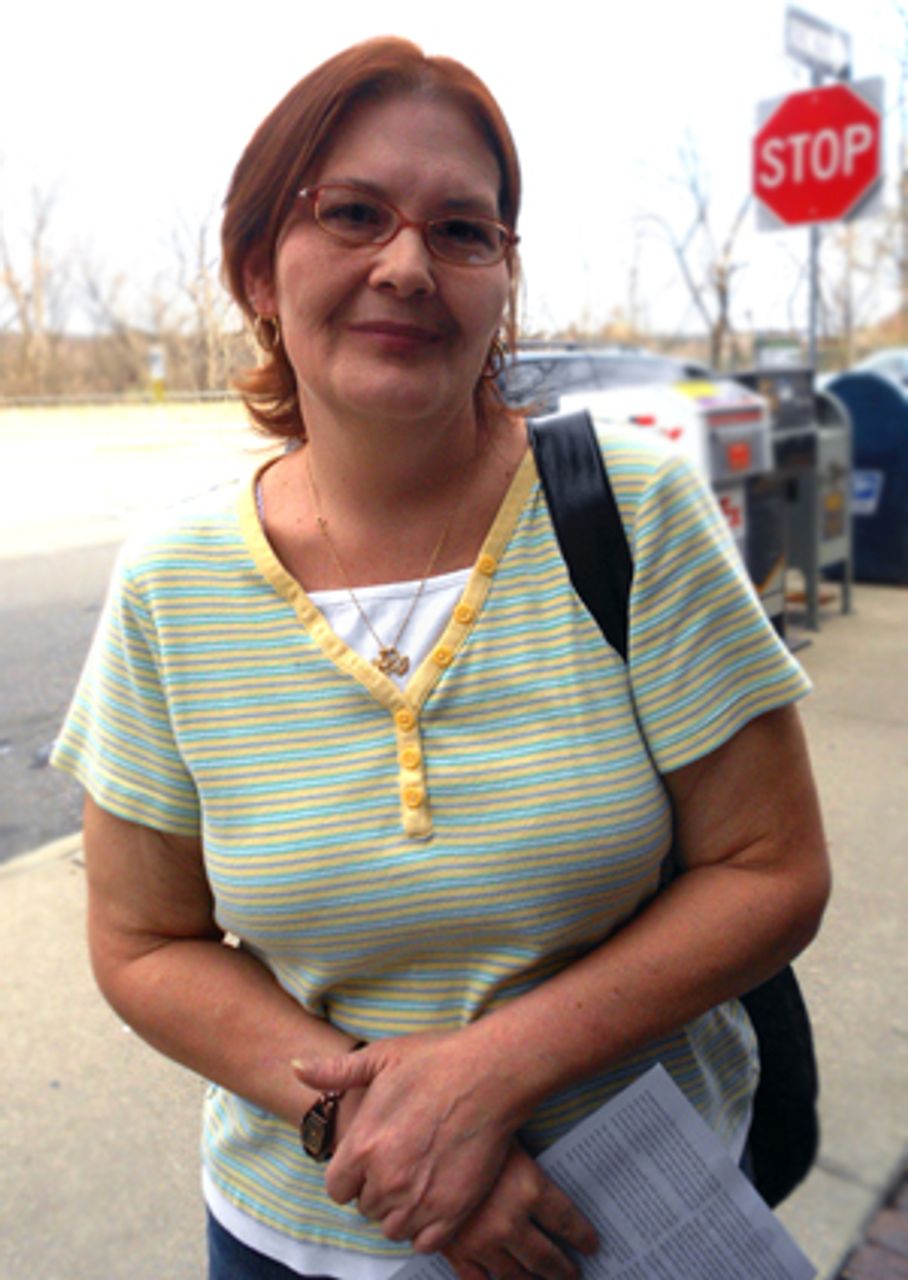National City, California
Supporters of the Socialist Equality Party campaign for US president recently visited National City, a predominantly Hispanic town and the second oldest city in San Diego County. The population of about 60,000 is largely working class.
As of 2010, nearly 60 percent of the population in National City lived in rental housing units due to the high cost of owning a home in southern California. Nearly 20 percent lives below the official poverty line, far above the average for the state. National City is home to many undocumented immigrants and their families.
We went to an indoor market and a neighboring restaurant buffet to hand out statements by Jerry White and to talk to workers.
 Mark and Vicky
Mark and Vicky“Promises, promises it happens every election,” Mark, a young worker, said. “They say that this is what I promise to do for you guys. This [term] nothing really came out of it. With the wars, both the Bush and Obama governments have treated soldiers callously and not even provided them with proper armor and equipment.”
Because of state budget cuts Mark’s father and mother were both forced to retire from their jobs. “I was working, but they cut me off, too,” he said, “my economic situation has put so much stress on me that I've contracted an anxiety disorder.” Mark told us he doesn't have access to even basic medical care or medication.
“We need people in office who know how to manage things much better. It’s sad to see people out here losing their homes. Everyone is just trying to live; everyone’s just trying to eat; and everyone’s just trying to survive. They need to see things from the eyes of people from the streets.”
David, who was in the military and was sent to Iraq and Afghanistan, said, “Obama hasn't lived up to his campaign promises. His motto was ‘change,’ and people voted for him because of it—but gas was an average of $1.70 [a gallon] when he came into office and now it's almost $5.00.
“He said he'd pull troops out of all these places but the troops are still there. Lots of them are pissed about it too. We didn't go to war with Iraq because of weapons of mass destruction; we did it for oil.
“Politicians don't care about us. They get us to go to war for special interests. Politicians like to talk about supporting the troops but they don't really care. Obama talks a good game, how he was going to do this and that, but nothing's come of it.”
Ape, originally from Western Samoa where much of his family still lives, told us that he was disinterested and fed up with politics.
“Politicians, politics, have done nothing for us. People in American Samoa are struggling worse there than over here. You never hear anything about that here in the US. Western Samoa, independent Samoa, isn't doing as bad as American Samoa. The US didn't send any aid to American Samoa during the tsunami. Honestly, I'm more interested in looking out for my own people, my family.”
We explained that the SEP fought for the unity of workers in every country, and that the corporations are seeking to drive down the wages of US workers to the level of workers internationally.
Asked about his life in the US, Ape said, “I work 6 days a week, I work two jobs. I don't see my family until Sunday. I have nine brothers and sisters as well as my mom and my dad to help out. Something is wrong with our society if you work two jobs, six days a week and still just barely manage to get by.”
Campaigners explained that the aim of the SEP in the election campaign was to build a socialist political party of the working class, that workers needed their own party that advanced a revolutionary program. We discussed how patience is required, along with confidence in working people, who will need to learn the lessons of their own history.
Ape said he was happy to see someone out doing something to change the situation. “You got my support, it'd be great to see the kind of movement you're talking about come together.”
Ann Arbor, Michigan
SEP campaigners spoke about health care and other social conditions with workers and visitors at the University of Michigan hospital in Ann Arbor.
Leonard, a custodian at the hospital and resident of nearby Ypsilanti, explained that he had seen higher turnover at the hospital among staff in the past couple of years. “I see a lot of temp workers coming through. They get on, and try to get a permanent position. They’ve got to keep temping; they get laid off for a month, then get called back. The hospital runs their own temp agency to keep the workers coming.
“I’ve worked here six years,” he added. “I came in as a temp, and worked to get on a permanent basis.”
Campaigners explained that the SEP was calling for a jobs program to put millions of people to work repairing infrastructure, including expanding hospitals and schools. Leonard said, “We definitely need that.”
He explained that he voted for Obama in 2008 because of the promises of change from the policies of the Republicans. After nearly four years, Leonard said he thought Obama’s record was “in between. I thought he would do a lot more for middle-aged people and working families than he did.”
 Patricia
PatriciaPatricia Perrigo is a resident of Oscoda, in northern Michigan. “My daughter is a patient here. We had to come down here because Oscoda does not have the specialists we needed. It is about three and a half hours. We will be here for at least a week. It is difficult because we’re a one-car family. My husband works full time. My daughter is a single mother, making this very complicated.”
SEP supporters asked Patricia what she was doing to manage while she was in Ann Arbor. “I am broke. I have 80 cents to my name, and no food. I’ve been sleeping in a recliner in my daughter’s room. I spent what money I had in the vending machines, and to help my husband pay for the four dollars a gallon for gas he needed to get back home.” Patricia told campaigners that the worst part was that she knew this situation was very common among the poor.
“Jobs are hard to come by in Oscoda,” she explained. “My daughter hasn’t been at her job very long, and she’s worrying that this will cause her to be let go. Legally, they can’t fire her, but she’s worried that they will find some way to fire her.
“We’ve been foreclosed on twice,” she said, pointing out that millions of others had gone through the same experiences over the past few years. “I am on Social Security for disability right now. It is only a little more than $600 [a month]. Rent is also $600 a month. I can’t marry the man I live with because we’re afraid I’ll lose my insurance and some of my benefits. We’re just barely surviving.”
On the present political situation, Patricia said, “As much as I would like to see change that politicians promise, I know they are only in it for themselves. Getting elected is a way for them to get rich. How many times have we seen the first act of a politician in office get a pay raise for themselves? They never represent their supporters.”
SEP campaigners explained that while politicians lied and pledged empty promises to the working class, their policies were representative of the interests of their real backers—Wall Street and the wealthy. This was evident in the billions of dollars being expended on the election campaign. “They don’t speak for us,” Patricia said, agreeing that the working class needed its own political party.
